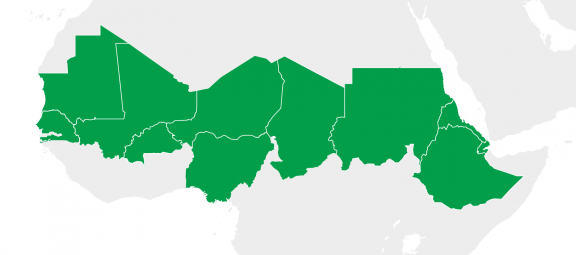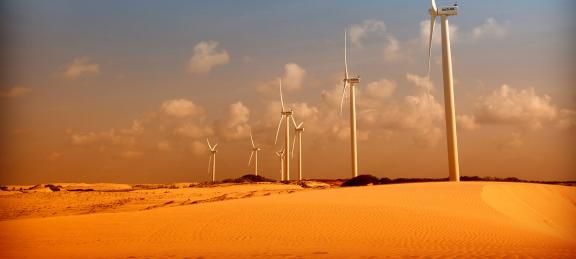The vision of the Great Green Wall initiative
The Great Green Wall (GGW) region in the Sahel, Africa that traverses from Senegal coast in the west to Sudan in the east is particularly vulnerable to climate change (Figure 1). Temperatures rising 1.5 times faster than the rest of the world are causing more intense droughts and floods, leading to increased desertification and degradation and threatening the livelihoods of most of the population.
Against this backdrop, the GGW initiative was launched in 2007 by African Union member countries. The initiative was originally envisaged to create a 15 km vegetation barrier across the Sahel. However, it has evolved into a gargantuan multi-sectoral landscape project spanning 8,000 km across the continent to restore 100 million hectares of the continent's degraded landscapes, combat desertification, and address the need for tackling the development and climate challenges at local, national and regional scale.
Data on this page as of 30 Oct 2023
The Green Climate Fund’s ambition in Great Green Wall countries
As the world's largest climate fund and as an operating entity of the Financial Mechanism of the UNFCCC, the Green Climate Fund (GCF) shares the GGW initiative's ambition to restore the continent's degraded landscapes, combat desertification, and help people in the GGW countries mitigate and adapt to climate change.
Upon the momentum reinvigorated at the One Planet Summit, GCF is committed to continuing to bring climate finance across the GGW countries to promote climate-resilient agriculture, ecosystems restoration, and climate-resilient infrastructure, particularly access to renewable energy. To this end, GCF can utilize the full range of existing tools and financial instruments, in compliance with the mandate given by the Conference of Parties to the UNFCCC.
Enhancing complementarity and coherence of GGW support: GCF support to the GGW is orchestrated in close partnership with our partners, demonstrating GCF’s ability to enhance complementarity and coherence across the climate finance landscape. In particular, GCF’s collaboration with GEF for the GGW initiative is strongly aligned with the Long Term Vision for complementarity, coherence and collaboration between the two organizations.
GEF: GCF collaborates with GEF to further strengthen and upscale the impact of the GCF investment in GGW through harnessing linkages with the previous/ongoing/future GEF projects, including Great Green Wall Climate Change Adaptation Regional Support Project supported by LDCF, Harnessing the Great Green Wall Initiative (GGWI) for a Sustainable and Resilient Sahel, projects under the GEF-8 including LDCF and SCCF, among others.
GGW Accelerator: GCF has regularly engaged in the meetings of the technical and financial partners of the GGW organized by GGW Accelerator and Global Mechanism of the UNCCD to promote robust coordination and exchange of knowledge.
Status of GCF support to the Great Green Wall countries
Where: GCF considers all our support to the GGW countries (including, Burkina Faso, Chad, Djibouti, Eritrea, Ethiopia, Mali, Mauritania, Niger, Nigeria, Senegal, Sudan) as contributing to the goal of the GGW Initiative. This includes funding from GCF funding proposals, simplified approval proposals and readiness across the eleven GGW countries as integral to supporting the countries achieve their climate ambition and sustainable development goal objectives.
Total GCF commitment: All approved projects and readiness grants in the GGW countries, since the inception of the GCF, are accounted as GCF commitment to the GGW initiative. As of July 2023, GCF approved 37 funding proposals, totaling approximately USD 12.3 billion (including USD 3.1 billion of GCF finance, and USD 9.7 billion in co-finance) in the eleven GGW countries. On the readiness side, GCF approved 44 grants, amounting to approximately USD 35 million in GCF finance. (Please refer to the list of projects & readiness grants for details).
Scope of GCF’s contribution to GGW pillars: The GGW Accelerator– launched during the One Planet Summit and coordinated through the Pan Africa Agency for the Great Green Wall (PAAGGW) with support from UNCCD – monitors and promotes investment to towards five specific pillars. GCF investment in the GGW region contribute to all five pillars of the initiative – GCF recognizes that the GGW initiative objectives need to be approached through tackling problems at national level, hence the Fund considers all of its support to the GGW countries as a contribution towards the GGW commitment. GCF’s support to the GGW initiative is monitored and reported using the existing integrated results management framework of the GCF.
Role of GGW Regional Support Programme: Approved at B.32, the funding proposal FP183 will finances the GGW Regional Support Programme (RSP) component 3 of the full proposal, which aims to increase the collective impacts of the individual GCF projects and programmes through enhanced knowledge management and exchanges as well as mapping innovation and digital transformation technologies and building a digital and innovation ecosystem. Specifically, the RFP aims to 1) enhance knowledge management and exchanges accelerating the uptake of best practices and learning and informing policy and investments across projects of the GCF and others; 2) map innovation and digital transformation technologies and build ecosystem, and; 3) establish GGW RSP Support Unit and governance structure.
The RSP is being implemented for a period of six years with total financing of US$ 12 million. It is important to note the RSP is not a grant making facility but will focus on the sharing of knowledge and complementarity between GCF and GEF programs and projects to maximize impacts.
Projects approved contributing to the GGW
For multi-country projects, the estimates are derived based on the funding average per a country for those projects securing no-objection letters from the GGW countries. N.B. The figures presented below are extrapolated from the project documents at time of approval. Approximation was made since in some projects there may be a difference in assignment of budget per country. Where projects have not specified a budget but rely upon finding appropriate equity investments in a country, the allocation of finance may be higher or lower in a country.






























